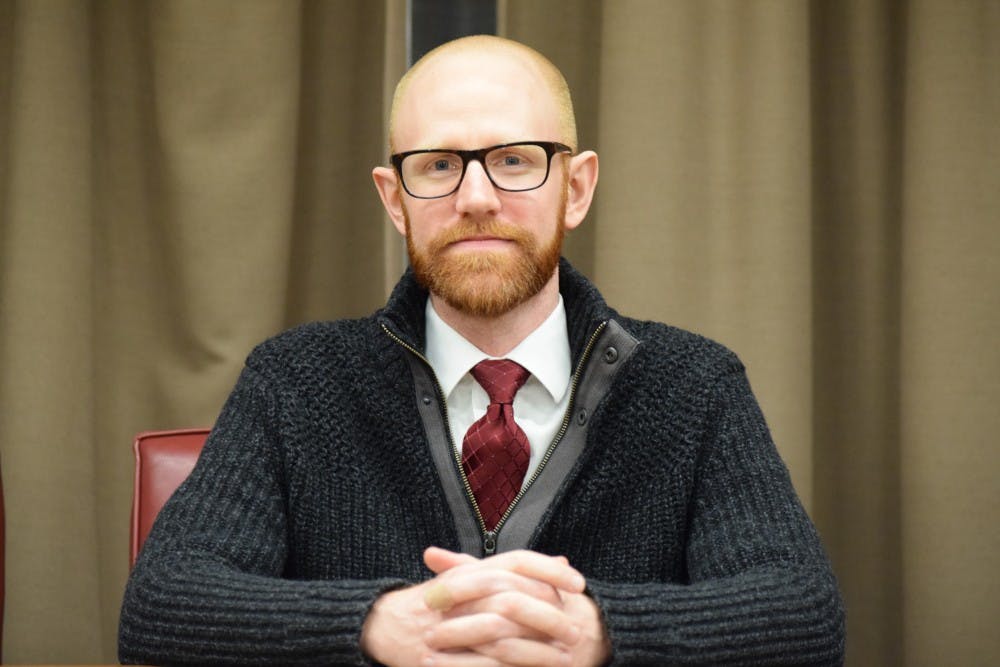At the head of one of the University’s most well-known organizations is Medical student Ory Streeter, the chair of the Honor Committee. As a father and training physician, Streeter brings a unique perspective to the student-run organization. While it is not the first time a graduate student has served as chair, it is more often that undergraduates serve this role in the Committee.
At the University, the Honor Committee works to enforce the Honor Code, which prohibits students from lying, cheating and stealing. If reported and found guilty of an Honor offense, the student could receive temporary or permanent dismissal from the University.
Prior to becoming a Medical student, Streeter worked as a staff member in Residence Life for five years and completed a post-baccalaureate premedical program at the University. Now enrolled as a Medical student, Streeter wanted a way to give back to his community by serving on the Honor Committee.
“In a combination of serving this community for five years as a staff member and engaging in some really intense academic work here as a student, and now being here studying as a Medical student, you can’t help from loving this place and wanting to make contributions back to it,” Streeter said.
Streeter said he was drawn to the Honor Committee because he wanted to make sure the entire process of an Honor case goes as smoothly as possible for both the reporters of and students accused of Honor violations. This can be an especially difficult time for students on both sides. As chair, Streeter ensures that there are appropriately trained people in place so that students going through this process are guided and supported and the process is fair to all parties involved.
Streeter succeeds the past three Honor chairs, whom were all undergraduates. According to Streeter, a major benefit he brings to the Committee is that his own viewpoints can be quite different than undergraduates.
Streeter said his medical training complements his role as Honor chair by improving his focus on each individual to pass through the Honor system.
“The U.Va. School of Medicine works hard to prepare patient-centered physicians who look beyond a diagnosis to care for the people behind the disease,” Streeter said. “My medical training helps me to remember that each individual who interacts with the Honor System, especially an accused student, is a person with a unique story and human needs extending beyond our case-processing.”
In addition, Streeter’s training as a physician allows him to empathize with students accused of committing honor offenses.
“I know that, as physicians, we often see patients at their worst — when they are sick, tired or hurting,” Streeter said. “They may say or do things that they would never say or do when at their best. Similarly, when our peers falter within our community of trust it's because they too are hurting — struggling, over-extended or isolated.”
Third-year College student Derrick Wang, the vice chair for community relations, said Streeter is also better suited to thinking about how Honor can reach out to students from all schools — not just undergraduates — which is something that the Honor Committee has struggled with in the past.
Streeter said that serving on the Honor Committee while keeping up with medical school has been difficult. During his first two years of medical school, Streeter was in the classroom most weekday mornings with some additional responsibilities in the afternoon, allowing for enough time to serve on the Committee. Upon entering his third year, Streeter was faced with more clinical responsibilities, making it more difficult to represent his school on the Committee. To compensate for this, he has had to make a few sacrifices along the way.
“The bigger piece is that I’m not just a Medical student — I’m also married, and I also have a child,” Streeter said. “So there’s a lot of flexibility and sacrifice on behalf of the family to make sure I have the ability to serve this organization and the U.Va. community in the best way possible.”
Streeter said that his wife Michelle has been accommodating of his Sunday evening Honor meetings, while the Honor Committee executive board has been understanding of his schedule as a Medical student. Streeter tries to bring his infant daughter, Mila, to whatever he can.
Now as a fourth-year Medical school, Streeter said his schedule has been more accommodating.
“The fourth year is elective-based, and we spend a lot of time front-loading our schedule,” Streeter said. “There’s a lot of flexibility to that schedule, and it offers a lot more time to serve the community through a position like an Honor representative.”
Streeter has served on the Honor Committee for the past two years and is currently serving his first year on the Executive Committee Board as chair. He hopes to illustrate to other students in his position the kinds of things that can be accomplished.
“The one thing that I would hope my service in this position illustrates for other graduate and professional students at the University is that you can do both things — you can focus on your academic work … While still making time to contribute back to this community,” Streeter said. “I would challenge all graduate and professional students to find ways to give back to the broader U.Va. community outside of your academic program.”







